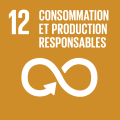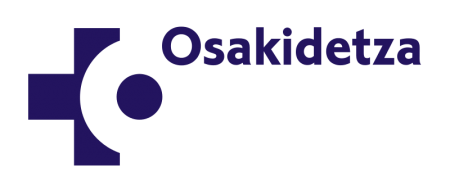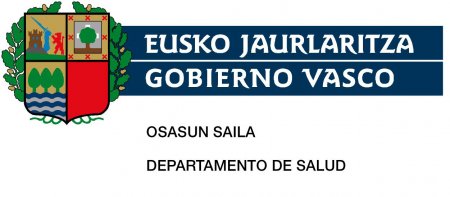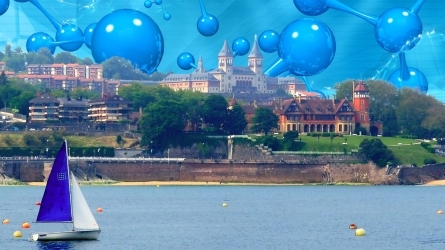
Sweeteners: health, obesity, safety and sustainability
Description
Sweeteners and their use in food processing and for health purposes is a subject generating nowadays big controversia, mainly because the real effects of the use of Sweeteners and Swetness enhancers on health are still unknown. In addition, the regulatory framework and consumers's perceptions of sweeteners and the use of these food ingredients is also under development. Given these premises, the EU funded the SWEET consortium, with the main aim of identifying and addressing the barriers and facilitators to the use of sweeteners and sweetness enhancers (S&SEs), as well as to examining the risks and benefits of using S&SEs to replace sugar in the diet in the contexts of health, obesity, safety and sustainability.
This Summer Course will serve as a channel for communicating to scientists, health professionals and general public the new findings on the use, acceptance and barriers within S&SEs use.
Objectifs
To offer the last updates on sweeteners research on health and weight management. How their use may help to maintain good health indicators or weight control.
To inform patients and caregivers on how sweeteners may affect appetite, microbiota and other metabolic factors.
To explain how food technology is integrating the use of S&SEs in foods, and the origin of this S&SEs, either plant-based or artificial.
To widen the knowledge of consumers' perceptions, barriers and facilitators for the use of S&SEs, as well as to give light to regulatory aspects and dissemination strategies.
Activité s'adressant à
- Unibertsitateko ikaslea
- Unibertsitarioak ez diren ikasleak
- Irakasleak
- Profesionalak
- Publiko orokorra
Programme
2022-06-27
Registration
Inaugurazio instituzionala. Parte hartzeko ordena:
- jason Halford | EASO - President
- Anne Raben - | University of Copenhagen - Professor
- Jose Alfredo Martinez Hernández | Universidad de Navarra - Professor
“Evidence of the role of sweeteners on appetite and metabolism emerging from systematic reviews“
- Santiago Navas Carretero | University of Navarra - Researcher
“The role of non-caloric sweeteners in body weight regulation and glycemic control - Facts, myths and current research“
- Anne Raben - | University of Copenhagen - Professor
“Sweet Taste: Hedonic Impact and Control Over Food Intake“
- Graham Finlayson | University of Leeds - Professor
Coffee Break
“Sweeteners, microbiota and metabolic health“
- Ellen Blaak | University of Maastricht - Professor
“Sweet Tooth“
- Kees de Graaf | Wagenningen University - Professor
Sintesia
2022-06-28
“Sucrose functionality in fine bakery ware and impact of sucrose substitution on nutrition and sensory profiles “
- Alain Le-bail | Oniris - Professor (Zoom bidez parte hartuko du)
“Production, efficacy and safety of novel plant based sweeteners and blends“
- Corey Scott | Cargill Ltd - Scientist
Coffee Break
“Consumption habits and acute effects of sweet beverage intake on appetite, metabolism and gastro-intestinal symptoms. Overview“
- Eva Almirón Roig | University of Navarra - Professor
“Consumption habits and acute effects of sweet beverage intake on appetite, metabolism and gastro-intestinal symptoms. Results of the Beverages Study“
- Jose Alfredo Martinez Hernández | University of Navarra - Professor
“Sweeteners Research: Using LinkedIn for impact in science“
- Sheree Bryant | European Association for the Study of Obesity (EASO) - Scientist
Sintesia
2022-06-29
“The EU regulatory framework for introduction of new S&SEs and impact on research and innovation“
- Monique Raats | University of Surrey - Professor
“Population based evidence about Sweeteners intake“
- Edith Feskens Johanna | Wagenningen University - Professor
“There is much to learn about the sustainability of sweeteners “
- James Suckling | University of surrey - Professor
Coffee Break
“The role of mass and social media in promoting risks and benefits of Sweeteners & Sweetness Enhancers“
- Monique Raats | Newcastle University - Scientist
Itxiera
- Anne Raben - | University of Liverpool - Professor
Directeurs

Jose Alfredo Martinez Hernández
Universidad de Navarra, Catedrático
Santiago Navas-Carretero se licenció en Farmacia por la Universidad Complutense de Madrid en 2002, y se doctoró en Nutrición en 2007 por esta misma Universidad, recibiendo además la mención “Doctor Europeus”. Se incorporó a la Universidad de Navarra en Octubre de 2008 y desde entonces lleva realizando sus labores de investigación en dicho Centro. Es investigador en el Centro de Investigación en Nutrición de la Universidad de Navarra. Es Investigador Principal de 2 contratos de investigación (Nutriprecisión y Medkids), 2 proyectos de Gobierno de Navarra (ALINFA y CORALS-centros educativos), además de haber participado en numerosos proyectos de nivel regional, nacional y europeo. Cabe destacar los proyectos europeos Food4Me, PREVIEW y SWEET. Además, es autor o coautor de 120 articulos científicos y capítulos de libros.
Conférenciers

Eva Almirón Roig

Ellen Blaak

Sheree Bryant
Sheree Bryant es directora de comunicaciones de la Asociación Europea para el Estudio de la Obesidad y proporciona apoyo de comunicación y difusión al proyecto SWEET.

Kees de Graaf

Edith Feskens Johanna
Wageningen University

Graham Finlayson
University of Leeds

Alain Le-bail
Professor Monique Raats is Director of the University of Surrey’s Food, Consumer Behaviour and Health (FCBH) Research Centre. FCBH research domains include: food-related behaviour and policy interventions (such as labelling, health claims) to achieve sustainable and healthy lifestyles; social, policy and ethical issues relevant to the grand societal challenges such as sustainability and obesity; study of food systems from the perspective of significant actors and stakeholders within the system; methodologically advancing the field of food consumer science through exploring novel sources of data and methods of data linking. She previously worked at the Institute of Food Research, Health Education Authority and University of Oxford. Her expertise is in the area of public health and behavioural nutrition research, gained on a variety of projects. Her research is wide ranging both in terms of topics covered (e.g. food choice, policy development, food safety) and methodologies used (e.g. qualitative, quantitative, stakeholder consultation). To date she has published over 140 refereed papers, other publications including 20 book chapters and edited two books ("The Psychology of Food Choice" and "Food for the Ag(e)ing Population").

Anne Raben -
University of Copenhagen

Corey Scott

James Suckling
University of Surrey
Dr James Suckling is a Research Fellow at the Centre for Environment and Sustainability, within the University of Surrey, UK. He trained as a physicist, before working for 6 years in R&D at Sharp. He has worked in sustainability for 6 years and researched diverse topics including circular economy models for mobile phones, up-scaling of niche innovations in the water-energy-food nexus, rearing insects for food and feed, and upscaling of smart local energy systems. All his research in CES has had a multi-disciplinary focus, including technical and social aspects throughout. He has expertise in life cycle assessment. His latest role is on the EU Horizon 2020 funded SWEET Project, researching the sustainability of replacing sugar with sweeteners and sweetness enhancers in food and drink.
Tarifs inscription
| Aurrez aurre | 2022-06-27 arte |
|---|---|
| 135,00 EUR | |
| 110,00 EUR | |
| 77,00 EUR | |
| 27,50 EUR | |
| 0 EUR |
| Online zuzenean | 2022-06-27 arte |
|---|---|
| 110,00 EUR | |
| 110,00 EUR | |
| 71,00 EUR | |
| 77,00 EUR | |
| 27,50 EUR | |
| 0 EUR |
Lieu de l'événement
Miramar Jauregia
Mirakontxa pasealekua 48, 20007 Donostia
Gipuzkoa
Miramar Jauregia
Mirakontxa pasealekua 48, 20007 Donostia
Gipuzkoa
Objectifs de développement durable
Chez UIK, nous voulons contribuer à la réalisation des objectifs de développement durable (ODD) 2030. Pour ce faire, nous avons identifié les objectifs auxquels nos programmes contribuent. Vous pouvez vérifier les objectifs ci-dessous.
L'Agenda 2030 est le nouvel agenda international de développement adopté en septembre 2015 par les Nations Unies. Cet agenda se veut un outil pour favoriser le développement humain durable sur toute la planète. L'éradication de la pauvreté, la réduction de l'inégalité et de la vulnérabilité et la promotion de la viabilité constituent ses principaux piliers. Il s'agit d'une chance unique de transformer le monde jusqu'en 2030 et de garantir les droits de l'homme à tous.
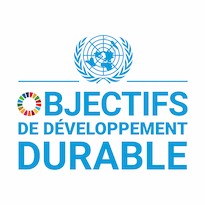
3 - Bonne santé et bien-être
Donner aux individus les moyens de vivre une vie saine et promouvoir le bien-être de tous à tout âge. Questions clés : couverture sanitaire universelle, santé sexuelle et procréative, diminution du nombre de personnes victimes d’accidents de la route, de la pollution et de produits chimiques, réduction du taux de mortalité maternelle et néonatale, fin des épidémies comme le SIDA, combattre l’hépatite et les maladies transmises par l’eau, prévention des drogues et de l’alcool, contrôle du tabac.
Plus d'informations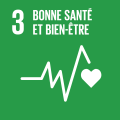
12 - Consommation et production responsables
Établir des modalités de consommation et de production durables. Questions clés : gestion durable et utilisation rationnelle des ressources naturelles, réduction des particules chimiques libérées dans l'air, l'eau et le sol, réduction des déchets, recyclage, réutilisation et réduction, pratiques durables, achat public durable, modes de vie durables, rationalisation des subventions aux combustibles fossiles qui sont source de gaspillage.
Plus d'informations